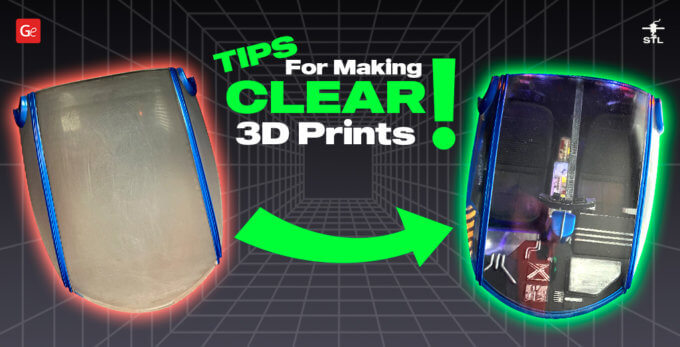Thorough filament drying is extremely important in 3D printing with plastic when you desire to create professionally looking miniatures, figures, and life-size models on a desktop 3D printer. If you work with more than one printer or 3D print with several colors at once, you might need a good filament dehydrator, such as Sunlu FilaDryer S4, in your workshop to eliminate strings and other issues caused by wet plastic.
Gambody’s chief engineer got a chance to unbox and review the new powerful S4 machine. Find out how it compares to FilaDryer S2, what alternative usage it offers, and how it can change your hobby.
About Sunlu
Sunlu specializes in the production of filaments for 3D printing and dryers for them. The company’s undoubted hit, Sunlu FilaDryer S2, has gained great popularity among 3D printing enthusiasts, all thanks to its interesting design, simple controls, and stable high drying temperature, which allows you to dry even refractory filaments without problems. The S2 dryer is ahead of its competitors in many respects and pleases the eye with its price.
Gambody’s team of engineers fell in love with FilaDryer S2 and still uses it a lot since it lets you forget about sealing plastics in bags or buying silica gel for drying. These days, it’s enough to place the filament into the dryer for several hours before 3D printing and forget about any problems associated with plastic moisture.
You can read our review of the S2 dryer and see if you wish to switch to or add the newest Sunlu FilaDryer S4 to your family of filament dehydrators.
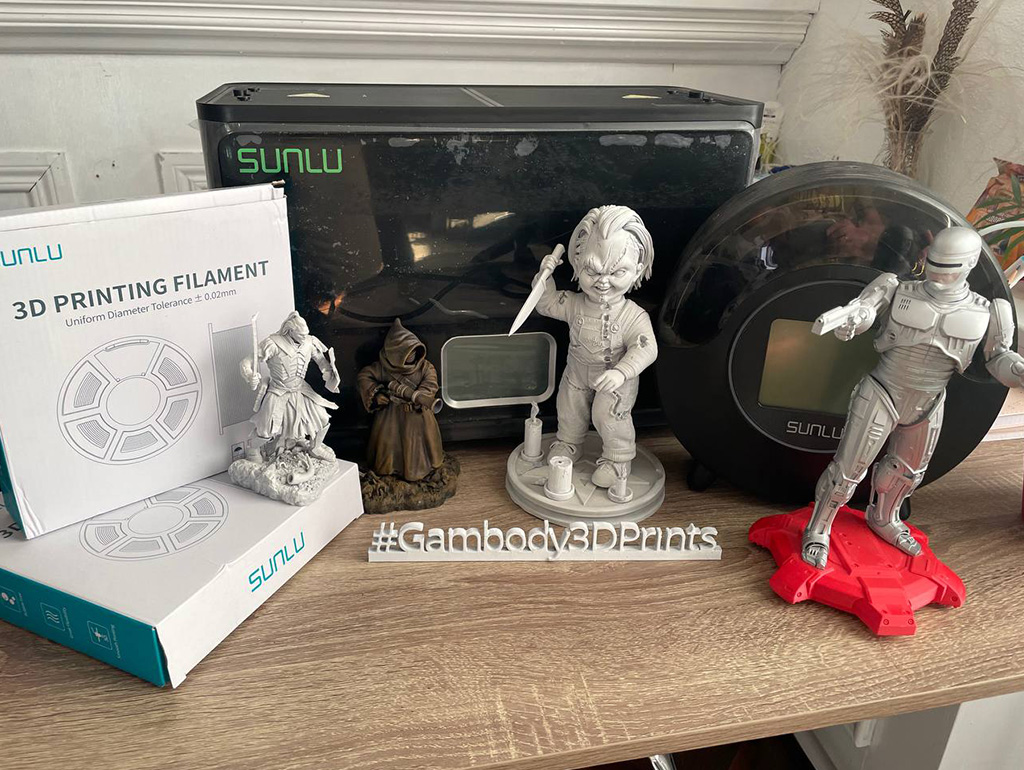
Sunlu FilaDryer S4
Not long ago, Sunlu presented their latest Sunlu FilaDryer S4. It is not an updated version of S2, as the name might suggest. Sunlu S4 dryer is a completely new product expanding the company’s line of the best filament dryers.
If the impressive Sunlu FilaDryer S2 is considered a home dryer for 3D printing enthusiasts, then the new S4 series can be proudly called a professional solution that is suitable for 3D printing laboratories. This 4 spool filament dryer can officially accommodate four 1kg spools, yet Gambody managed to place six spools inside this machine!
The new release offers incredible possibilities, and we will share all the particulars in our detailed Sunlu FilaDryer S4 review.
Best Filament Dryer
What is the best filament dryer? Also known as a filament dehydrator, a regular dryer is designed to remove moisture from plastic to improve the 3D printing process, while the best filament dryer is designed to simplify your life by offering user-friendly controls and great results with the least amount of effort.
If you hear popping or crackling noises while printing and the extruded filament appears uneven and non-smooth, this may indicate you are using wet material. The moisture expands when heated, which disrupts the continuous profile of plastic extruded through the nozzle and can lead to imperfect 3D prints. TPU and nylon are two types of particularly moisture-sensitive materials that absorb moisture faster than common filaments like PLA. Therefore, it is recommended to store TPU and nylon in airtight containers, or use the best filament dryer to work with these 3D printing materials with no issues.
Read also: Best Tips on How to Store 3D Printer Filament.
The filament dryer, equipped with a heated chamber that houses spools, removes moisture and ensures a steady plastic supply. You can dry the filament before 3D printing or feed it directly from the dryer to your 3D printer, and choosing the best filament dryer is your top priority.
Sunlu S4 Dryer Unboxing
Sunly FilaDryer S4 arrives in a fairly large box of 14.5 x 11 x 19.7 inches (370 x 280 x 500 mm) and takes up almost all of the inside space! This filament dehydrator is 17.9 x 8.7 x 12 inches (457 x 222 x 305 mm), which is really impressive as it looks much smaller in the online photos.
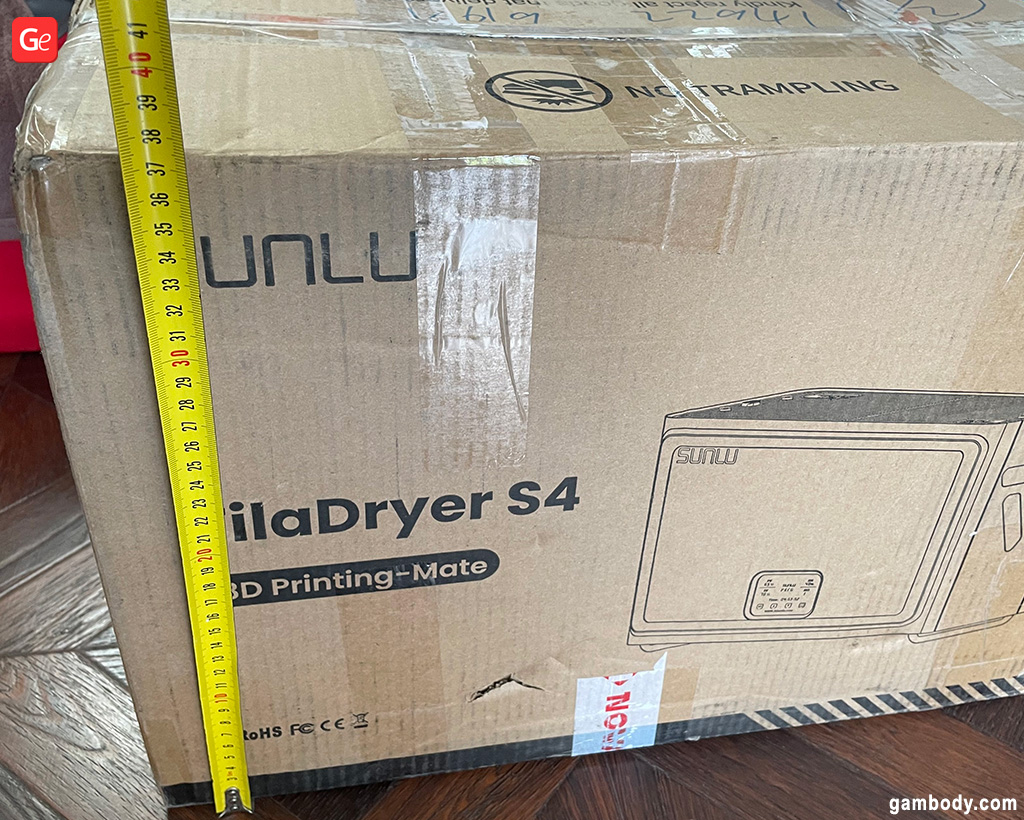
The Sunlu dehydrator’s size is great and will easily accommodate up to four standard-size spools of filament. The kit includes the Sunlu filament dryer manual and a set of Teflon tubes and hole plugs. It is great that the power supply no longer comes separately. It is hidden inside the dryer, which is convenient! The 350W dryer has a maximum heating temperature of 158 °F (70 °C).
Sunlu Dryer Box Design
The 4 spool filament dryer has a shape of a black translucent box with a large touch screen in the middle. The front part is covered with plastic glass similar to the one in the FLSUN V400 enclosure, which can be easily scratched even if you wipe it with a not-so-clean rag, so we decided to leave the protecting film on.
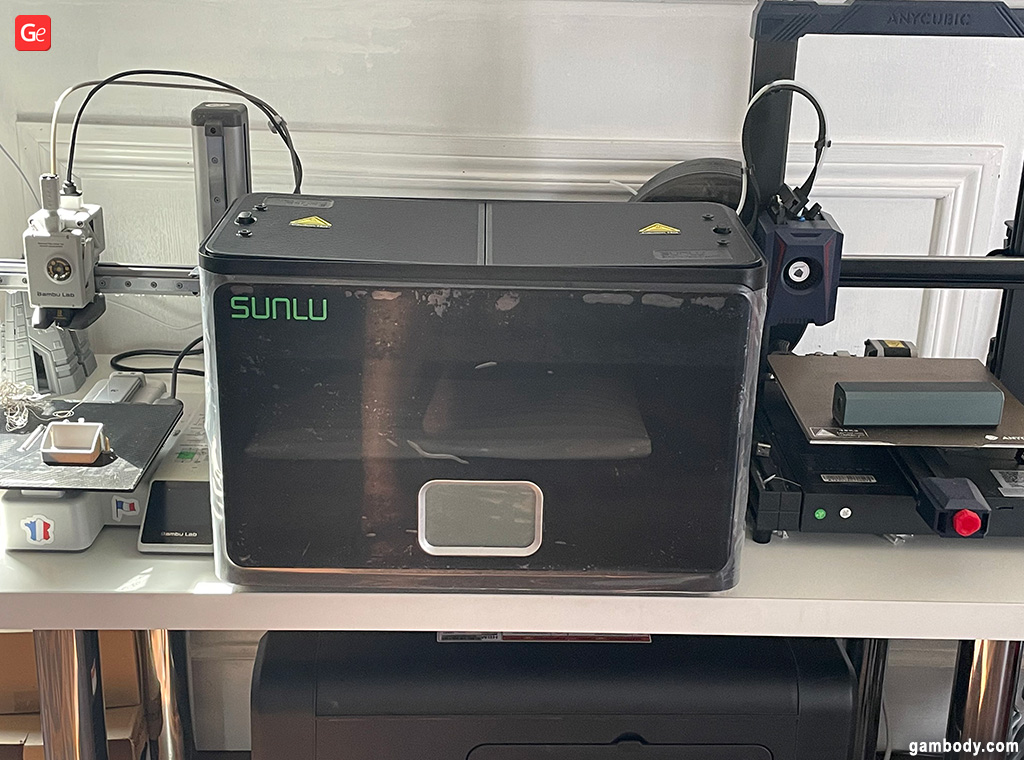
The manufacturer suggests loading filament into the dryer using the two separate doors on the top. Each door latches securely and tightly, greatly reducing the noise level of the fans inside. The box has metal legs at the bottom, which makes the overall appearance more expensive. In general, the design pleases the eye, being uniform and minimalistic with nothing extra.
What’s Inside?
Inside, the chamber is divided into two identical sections, each of which has a pair of rubberized rollers that spin on bearings (replacing them is as easy as in the S2 version). Each section has its own cooler, and there is a lid-closing compartment for silica gel.
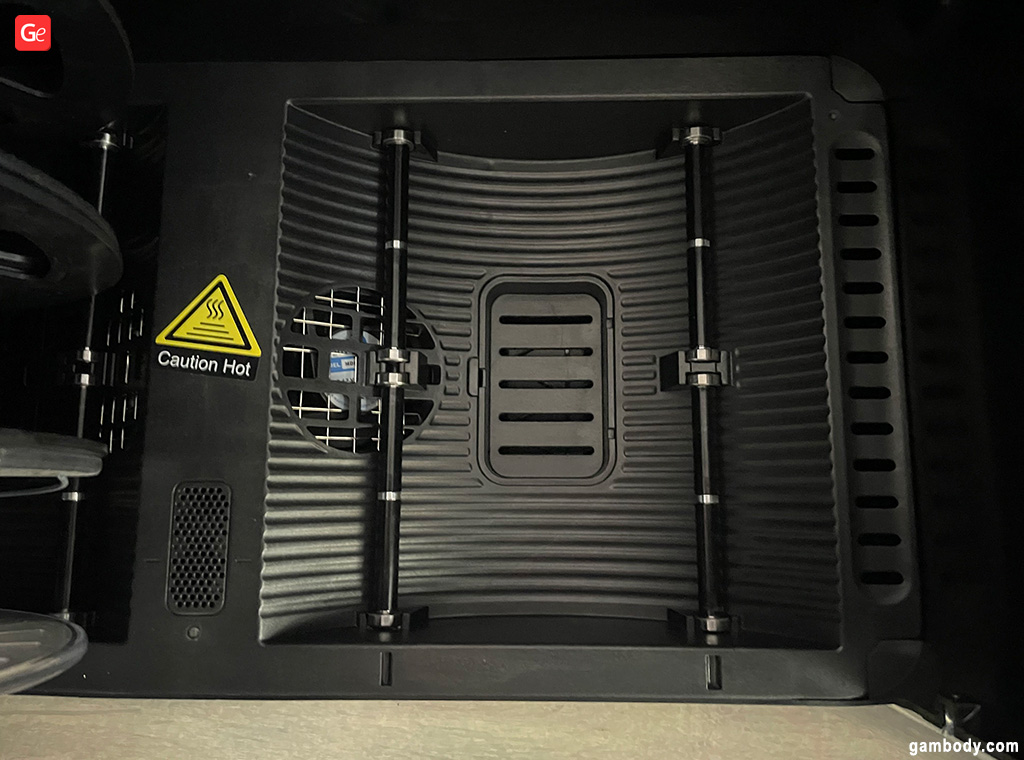
The manufacturer suggests installing two spools (with a maximum width of 29.5 inches or 75 mm) on each side. However, no one can stop you from experimenting. For example, we were able to place six standard spools inside (you can do this too to either store them or dry the filament).
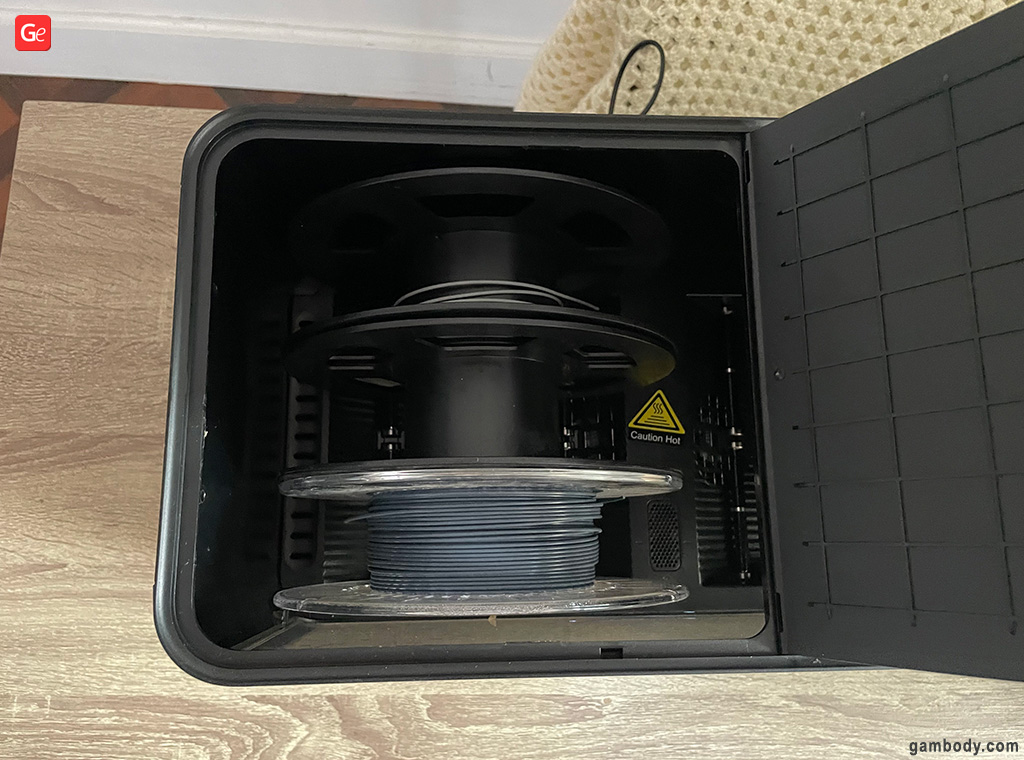
Read also: Over 100 Fun 3D Printer Projects.
Screen
As you plug your Sunlu FilaDryer S4, the first thing we see is the pleasant green backlight (just as on the S2 model). It’s a small thing, but I really like it! Unlike in the S2, the screen and font size of the S4 are smaller, but this does not interfere with its use. It seems that the pixel density has been increased, and the screen itself has become more responsive to touch.
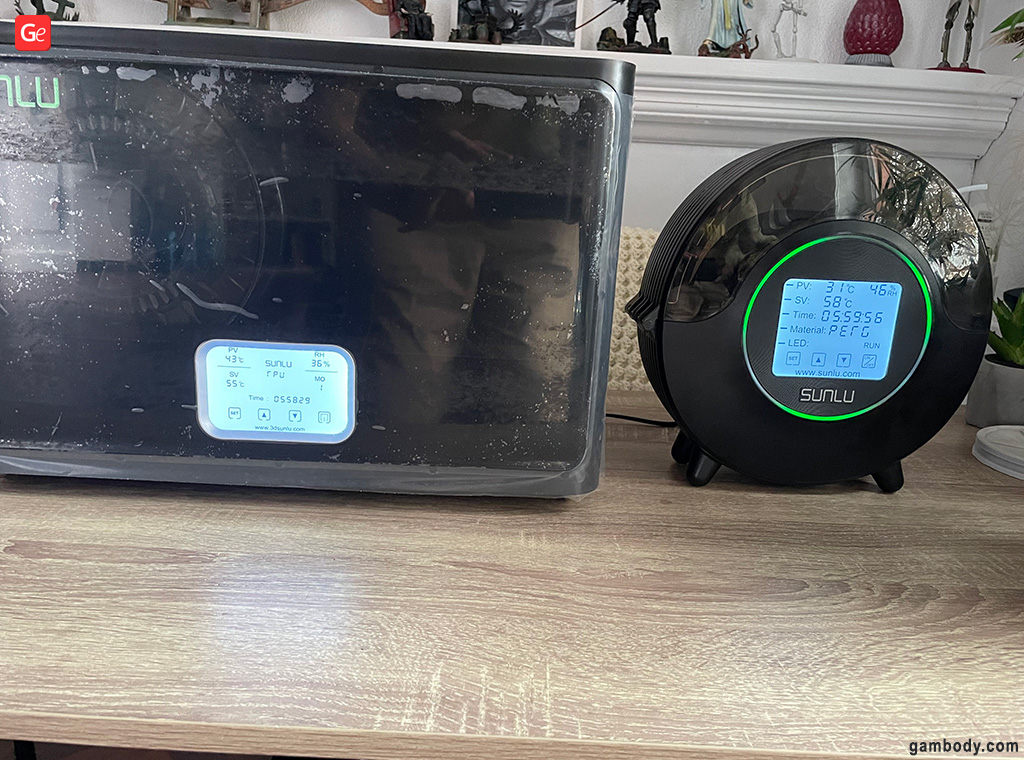
The functionality remains the same as in the S2. You can set up the temperature, humidity, and drying time using the front panel. Each common filament (PLA, ABS, PETG, PA, or PC) has its preset configuration. Thus, all you have to do is simply select your filament type and press “Start.”
Sunlu FilaDryer S4 operates in two modes:
- The first is a timer, where the temperature and drying time are set;
- The second is moisture control, where the machine maintains the humidity level within 20%, automatically turning the dryer on and off as needed. This mode is especially useful for storing your 3D printing plastic.
Sunlu S4 dryer has eight filament holes to let you dry multiple filaments and printing on four 3D printers at the same time. Personally, I see this dehydrator as a more professional solution and would like to have some additional settings, such as controlling fan speeds and noise.
Read also: Best 3D Printer Ventilation System for Resin and Filaments.
How to Use 4 Spool Filament Dryer
It is simple to use FilaDryer S4. Place up to four 1kg spools of filament inside the chamber, where they will sit vertically on the rollers. Loading plastic is convenient, thanks to the large device doors. After plugging the Sunlu dehydrator and pressing the main switch on the rear panel, the “power” symbol appears on the control panel, starting the drying process. The fans will run, and the dryer will heat up to the temperature and humidity settings you have chosen.
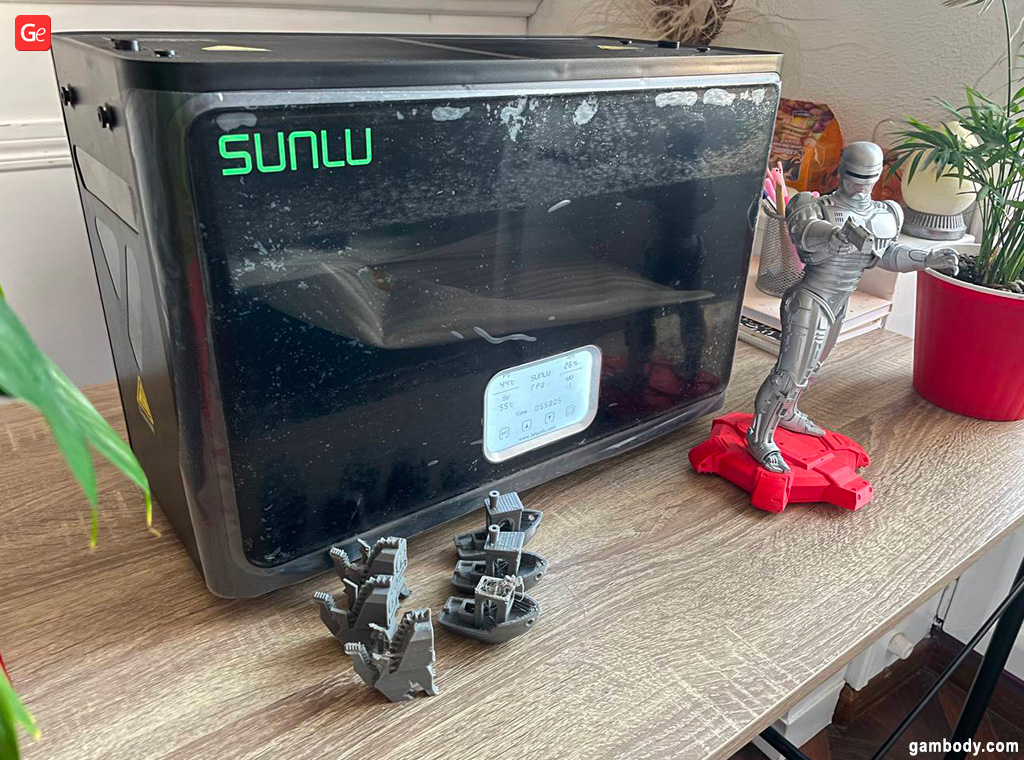
In testing, we let this 4 spool filament dryer heat to its maximum temperature of 158 °F (70 °C) in less than 5 minutes. It used about 400 W of power while heating, but afterward, it used only about 80 W to maintain the temperature. At room temperature of about 78 °F (26 °C) and a humidity of 55%, the dryer effectively reduced the humidity levels inside the chamber, ensuring stable drying quality.
The fans are quite noisy when the dryer is operating. If you stick your hand inside, you can even feel how the hot air masses are mixing. Closing the lid helps a lot to reduce the noise, after which the drying chamber is only slightly louder than the S2 version. As noted above, I would like to see the silent mode in the future.
Running Tests
The main problem that occurs when you 3D print using wet plastic is a large number of strings, unstable printing, a clogged nozzle that can completely ruin your print, and pieces of uneven rods breaking off, all of which cannot be fixed by changing the printing configurations.
To test Sunlu FilaDryer S4, positioned by the manufacturer as the best filament dryer, we used Sunlu TPU Grey plastic. We chose TPU because this soft plastic absorbs moisture especially well, so using it in our experiment sounds perfect.
To prepare better, we stored the plastic without a bag and hydrogel in a humid environment for a whole week. Firstly, we 3D printed a GeZilla 3D printing model as a test using the following options (we did not use Sunlu S4 dryer at this stage):
- Test 1 – we worked with a nozzle preheated to 446 °F (230 °C);
- Test 2 – we printed with a nozzle preheated to 374 °F (190 °C).
- Test 3 – we dried plastic in the Sunlu S4 filament dryer for 6 hours and repeated our test. You can see the results in the photos below:
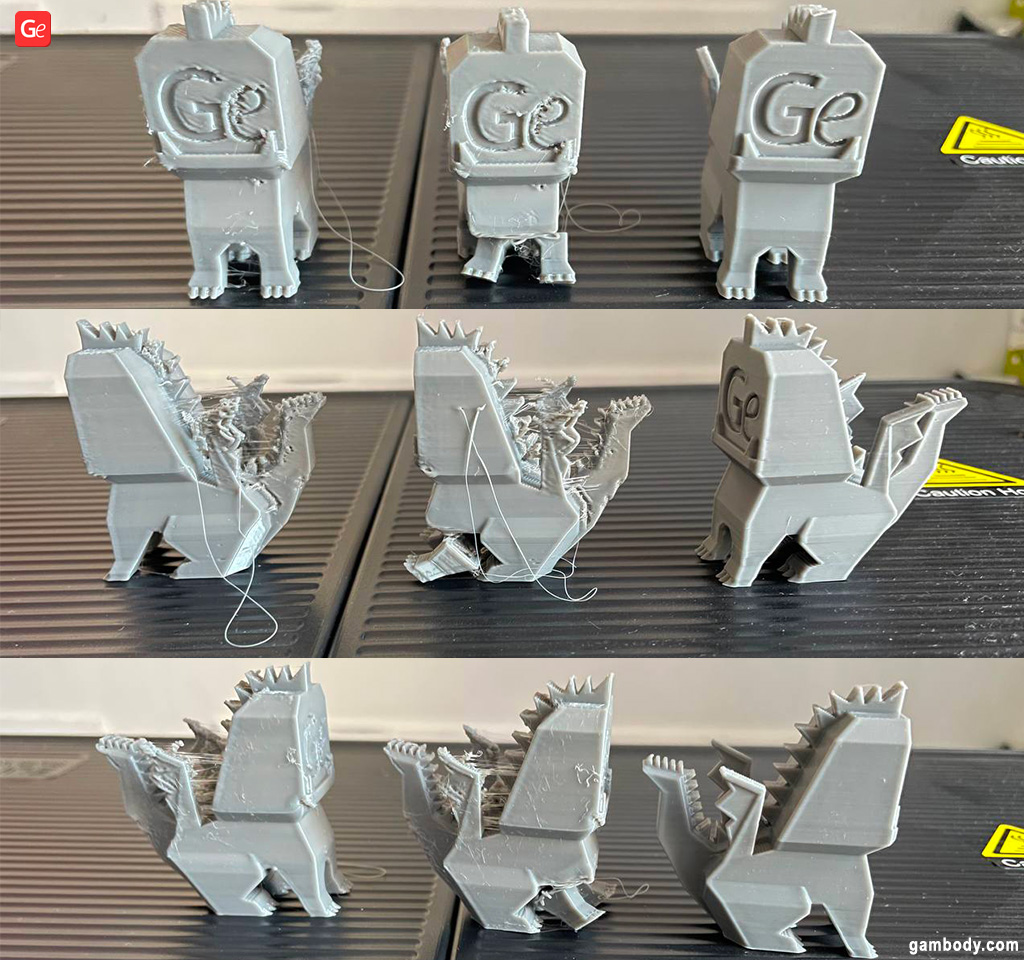
Our Benchy boat test also showed a noticeable improvement in 3D printing quality after we dried the plastic in the Sunlu dryer box at 131 °F (55 °C) for 5 hours. Such results prove how important it is to have the best filament dehydrator if you strive for excellent 3D prints.
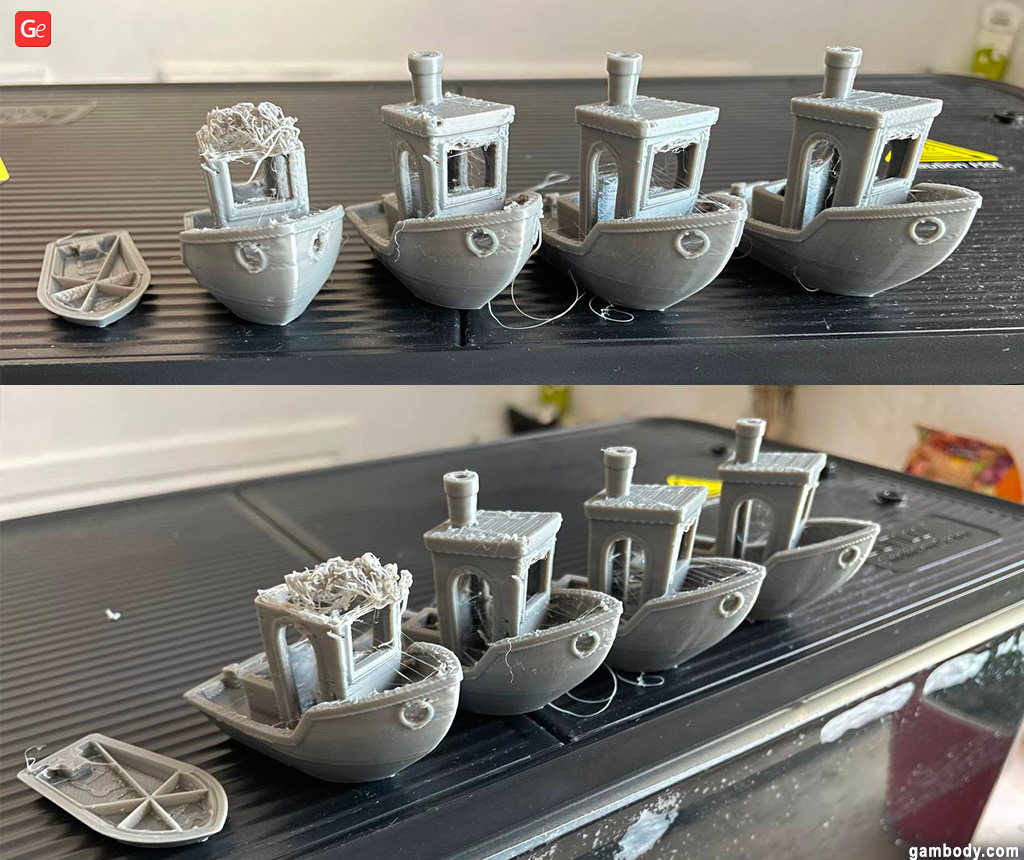
Using S4 with AMS Mini
One of the first things that came to my mind while reviewing this 4 spool filament dryer was, “Is it possible to connect Sunlu S4 to Bambu Lab A1 mini 4-color printing 3D printer with AMS lite?” While the standard AMS version stores spools inside the chamber, where you can add silica gel, the mini AMS is an open chamber machine.
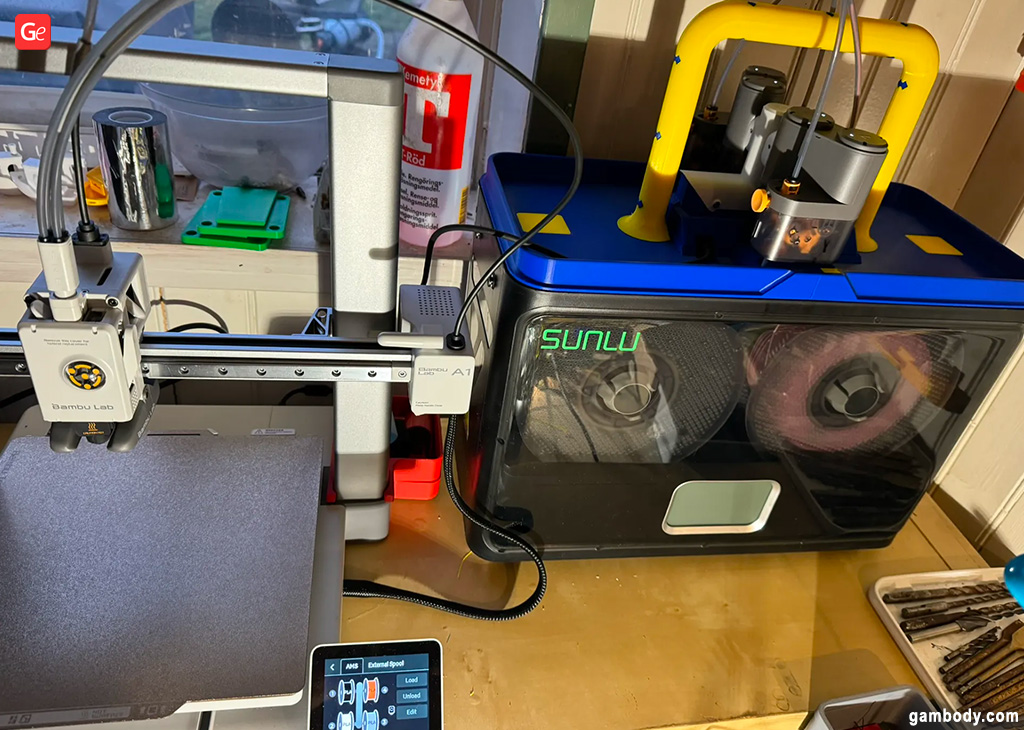
Well, to my surprise, I’m not the only one who asked this question! More to say, there is a 3D printing project that can combine Sunlu FilaDryer S4 with the AMS mini filament feeding system. You simply need to download the files, 3D print all the parts, and assemble them. Besides, you can increase the space for your Sunlu dryer box, 3D print a tray for it and organize your workspace.
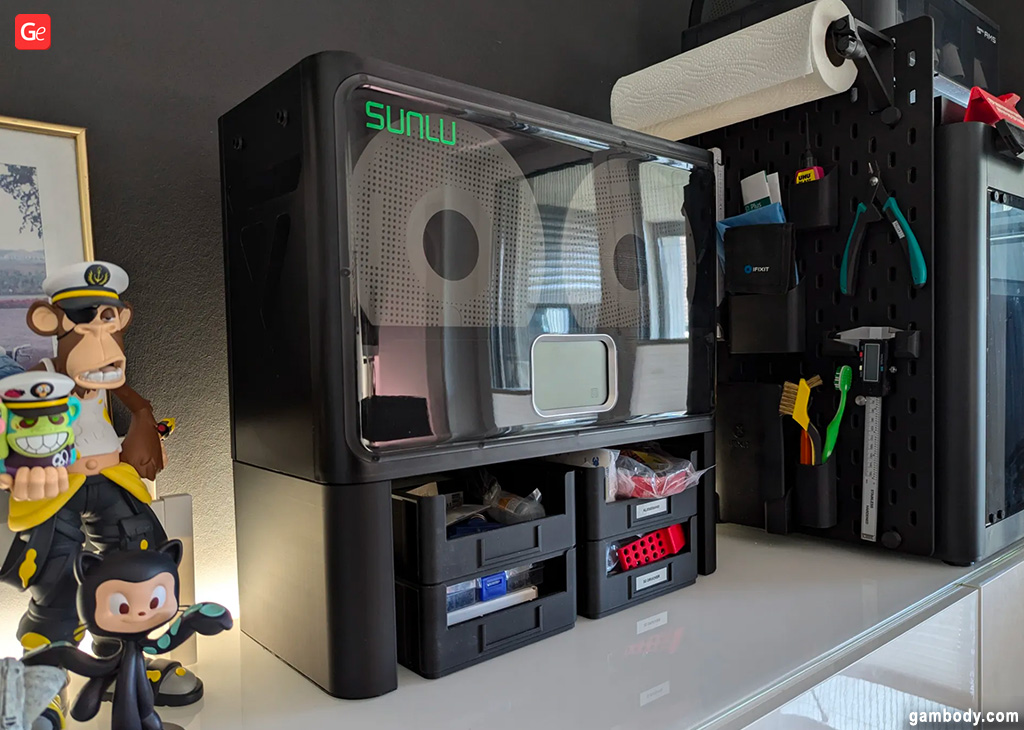
Extra Features & Alternative Ways to Use
Let’s think about how you can potentially use your FilaDryer S4 at home besides keeping your filament dry. Thanks to its large size and rectangular shape, your filament dehydrator can help you dry light clothes. Or you can use it as an acetone bath.
You can also think of using its low-humidity and high-temperature features for your other purposes.
Read also: How to 3D Print Flexible Filament at Home.
Sunlu FilaDryer S4 is a powerful professional filament dehydrator. Its large size only reveals its potential. Since this machine requires some space, you need to think about your desk layout before making a purchase. Big dimensions, however, will help you to dry plastics for two or four 3D printers at the same time or simply store up to six 1kg spools of filament inside the chamber to prevent moisture. You can also adapt the Bambu Lab AMS lite to use with this 4 spool filament dryer.
What do I lack in the FilaDryer S4 version? Perhaps I was expecting its display to offer more settings. I like to work in silence, and if the dryer is located close to your workspace, the fan noise can be distracting. What I also noticed is that the S4 dryer consumes more electricity than the S2.
In general, Sunlu S4 is a powerful and highly productive dehydrator. If you 3D print a lot and have more than one 3D printer, this can be the best filament dryer in your workshop.


